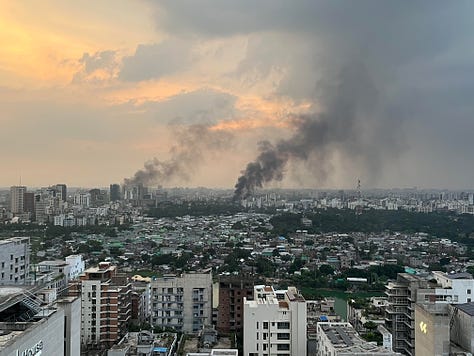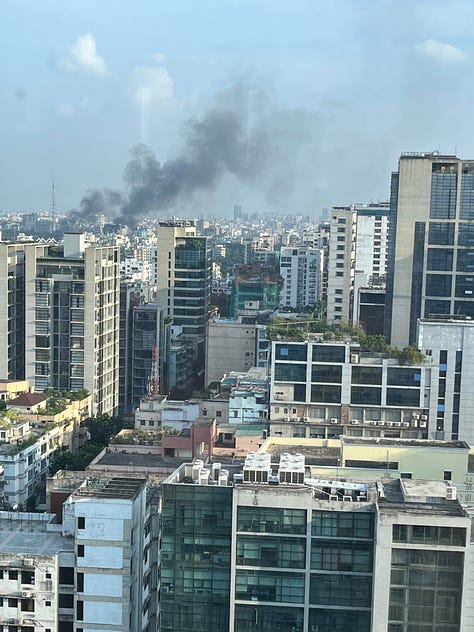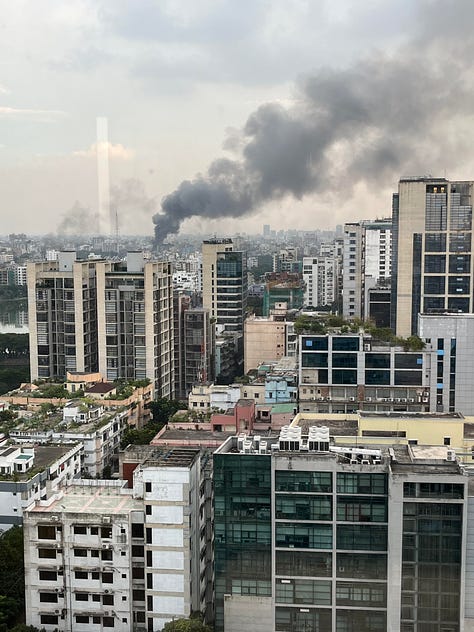I know everyone is talking about the attempted assassination of Donald Trump, the speeches coming out of this week’s Republican National Convention, the choice of J.D. Vance to be the Republican Vice Presidential candidate, and whether or not Joe Biden will drop his reelection bid. But I’m not going to talk about any of that. Too many other people already are, and this isn’t the place for those discussions. Instead, I’ll write about events you may not be paying attention to, such as the ongoing unrest in Bangladesh, where students clashed with security forces this week.
The protests began over unpopular quotas for government jobs. Up to 30 percent of Bangladesh’s stable, lucrative government positions go to the family members of veterans who fought in the country’s 1971 war of independence from Pakistan.
Protesters say this policy is discriminatory and favors supporters of the ruling Awami League, which led the fight for independence. It’s long been a point of contention, and the policy was briefly scrapped before being litigated in the courts and ultimately reinstated.
Some student protests began over the issue in late June. But violence escalated suddenly this week when student activists from Dhaka University clashed with the police and government-backed paramilitary forces.
Hundreds of people have been injured, and dozens have died. Most major universities have closed their doors until the violence subsides. The government cut off Internet access and phone service. It also tried to ban public rallies, but students are defying the orders and taking to the streets anyway.
Ultimately, these protests are about the ruling party and its grip on power. The clashes occurred just months after Sheikh Hasina Wazed won re-election. The government had jailed opposition politicians ahead of the polls, and opposition parties boycotted the vote, raising serious questions about the legitimacy of the Awami League’s electoral win.
The protests are also about the economy and the fact that so many young people struggle to find well-paying jobs after graduation.
A friend was visiting Bangladesh this week for work, and she was kind enough to share some photographs of Dhaka with me. They’re very eerie.



Lazo Magazine is now on social media. You can follow along on Facebook, Twitter, LinkedIn, and Instagram. And if you can donate to Lazo Magazine or become a paid subscriber to this newsletter, that’s always appreciated.
What I’m reading:
• Donald Trump will demand Russia-Ukraine peace talks as soon as he is elected and has developed “well-founded plans” for doing so, Hungary’s Viktor Orbán claimed in a private letter seen by the Financial Times.
• Members of the European Parliament demanded that Hungary’s European Union voting rights be stripped after Prime Minister Victor Orbán’s trips to Russia and China. The letter, signed by 63 MEPS, was obtained by Politico Europe.
• Building a quasi-dictatorship in a place where most people believe in democracy is a particular art that Viktor Orbán has mastered, Zack Beauchamp writes for the Atlantic. Now, U.S. politicians are trying to emulate it.
• Estonian Prime Minister Kaja Kallas stepped down to become the European Union’s next foreign policy chief later this year, ABC News reports.
• In a victory for Ukraine, the Atlantic Council writes that the Russian Navy withdrew its last remaining patrol ship from occupied Crimea.
• Germany, Ukraine’s second biggest military donor, is planning to nearly halve its military aid for Kyiv next year, from around €8 billion ($8.7bn) to around €4 billion ($4.4bn), according to a draft budget approved by the government. BBC News has the story.
• Germany’s proposed 2025 budget requested only a moderate increase in military spending, raising doubts that Chancellor Olaf Scholz can fulfill his promise to overhaul the country’s military, the New York Times reports.
• Belarusian authorities expanded temporary visa-free travel for residents of 35 European countries in a bid by President Alexander Lukashenko to try to improve relations with the West, the Associated Press reports.
• Chinese and Belarusian troops simulated the capture of an airport in an exercise near the border with Poland and Ukraine, the South China Morning Post reports.
• Armenia launched joint military drills with the United States, the Associated Press reports. Amid souring ties with Russia, the “Eagle Partner” war games aim to increase the interoperability of units participating in international peacekeeping missions.
• EurasiaNet reports that the ongoing joint military exercise involving a comparatively small number of American and Armenian troops at a base in the Yerevan suburbs has caused a paroxysm of rage in the Kremlin.
• Azerbaijan reopened its embassy in Iran after more than a year of negotiations between the countries to ease tensions, the Associated Press reports.
• From Spain to Serbia, Europe’s populists are using the assassination attempt against former U.S. President Donald Trump to slam the left, Politico Europe reports.
• A slate of recent, increasingly harsh policies has made life unbearable for refugees in Cyprus, InkStick Media reports.
• Around 100 Indians paid up to €20,000 to reach northern Italy, living in overcrowded old houses and being exploited as warehouse workers by cooperatives serving large retailers, the JournalismFundEU reports.
• French President Emmanuel Macron accepted the resignation of Prime Minister Gabriel Attal and his government, Politico Europe reports. The outgoing administration will now play the role of a caretaker government until a new executive is appointed.
• In France, the Olympic games have exacerbated the housing crisis in Paris and displaced thousands of precariously housed people, the DIAL reports.
• Germany banned the far-right Compact magazine, accusing it of stirring up antisemitism and hatred against people with immigrant roots, the Associated Press reports.
• David Lammy called for an immediate ceasefire during his first visit to Israel and the Palestinian territories as the United Kingdom’s new foreign secretary, the BBC reports.
• A Dutch court rejected a claim by human rights organizations that the Netherlands is dodging a court order to halt shipments of F-35 fighter jet parts to Israel, the Associated Press reports.
• The Israeli Knesset voted overwhelmingly to pass a resolution rejecting the establishment of a Palestinian state or a two-state solution, the Times of Israel reports.
• The International Court of Justice, the top judicial arm of the United Nations, ruled that Israel should bring an end to its illegal occupation of Palestinian territory, cease new settlement activity, evacuate existing settlements, and pay reparations to Palestinians who have lost land and property. The Washington Post has the story.
• Former commanders of the Netzah Yehuda battalion, an Israeli military unit the United States accused of gross human rights violations, were promoted to senior positions in the IDF and are now actively training ground troops as well as running operations in Gaza, a CNN investigation found.
• Israel’s ultra-Orthodox Shas party urged potential conscripts to ignore a call-up from the Israeli military, CNN reports.
• A surprise drone attack in Tel Aviv killed at least one and injured eight others, the Washington Post reports. Yemen’s Iranian-backed Houthi group claimed responsibility for the strike.
• Colombia’s government called off a ceasefire with some factions of the Estado Mayor Central rebels, led by commander Ivan Mordisco, Reuters reports.
• Rwandan President Paul Kagame won a new seven-year term with over 99% of votes, the Wall Street Journal reports.
• A New York grand jury indicted a former CIA analyst and prominent North Korea expert, Sue Mi Terry, on charges of secretly working for the South Korean government in exchange for bribes. The Washington Post has the story.
• U.S. intelligence agencies were tracking a potential Iranian assassination plot against former President Trump in the weeks before Saturday’s shooting, the New York Times reports. Officials said they did not consider the threat related to the shooting.
• U.S. authorities charged the suspected leader of an Eastern European-based neo-Nazi group, the Maniac Murder Cult, with planning to poison Jewish and minority children in New York City. Georgian national Michail Chkhikvishvili was indicted on four charges. According to the Russia-based think tank the Sova Center, neo-Nazis established the Maniac Murder Cult in St. Petersburg.
You can write to me for any reason: c.maza@protonmail.com





